Before becoming a father three years ago, 38-year-old Chua Sze Siong mostly saw libraries as public spaces where he could cool off on warmer days, and hardly visited them for other reasons. But the library has since taken on a new purpose. Mr Chua’s newfound affinity grew out of the necessity to find more places to bring his new-born baby on excursions.
“For newborns, it’s very hard to find places to go where it’s kid-friendly [and] conducive,” he explains.
Looking back on his family’s regular visits to various libraries in Singapore, over the years, he likens these to outings to the mall. For instance, a visit to Tampines Regional Library would typically involve a trip to the indoor playground within the library. He explains that he leaves his daughter Angela, who is now three years old, to play with her mother, while he browses for books to borrow: “That’s why it’s like a mall, because you get to spend time there, you get to do your own things.”
After the pandemic landed on Singapore’s shores, Mr Chua found that the libraries were vital as a destination for family outings.
“If you want to look for a physical space that has a lot of educational ability and [functionality], I think it’s the library,” he says. “It became more important with the pandemic, because you can’t go to a lot of places and the libraries [are] one of the places where it’s safe. Now, we cherish the chance [to visit] a library.”
While his daughter used to participate in Storytime sessions held at these institutions of knowledge, where librarians would read pre-selected books aloud to children, he says that she no longer does since starting school. But, he still borrows ebooks for her, and keeps up-to-date with available programmes through the National Library Board (NLB) mobile application.
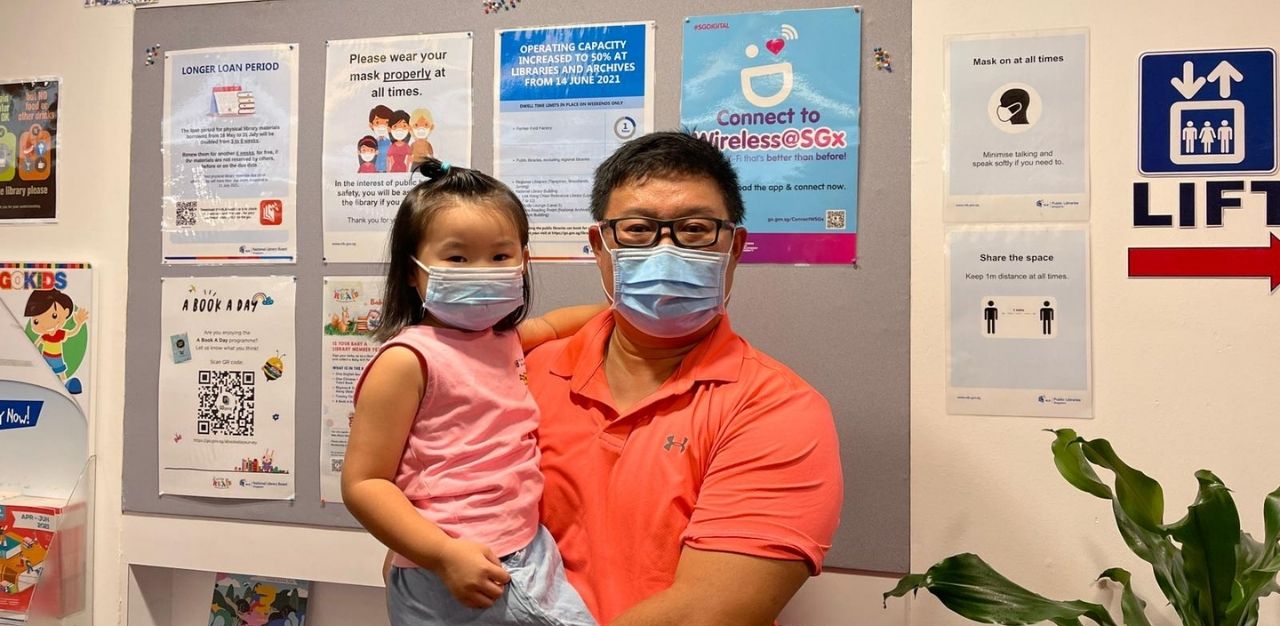
Blending the physical with the digital
For parents like Mr Chua, libraries are both a space to gain knowledge and to form precious memories. Due to the pandemic, many of the library’s in-person programmes were halted, prompting a surge in digitisation to meet the needs of the public, and to maintain accessibility to the libraries’ programmes and resources.
This has led to NLB introducing the Libraries and Archives Blueprint 2025, which examines how the statutory board’s priorities will evolve from 2021 to 2025 to fulfill the goal of nurturing an inclusive digital society.
Assistant Chief Executive of NLB’s Archives & Libraries Group Catherine Lau shares that the plan focuses on five key roles: championing lifelong learning, bridging the digital divide, documenting and telling Singapore stories, strengthening citizen engagement, and promoting information literacy.
Covid-19 has led to an increase in usage of NLB’s digital resources, says Ms Lau. Take the 26 per cent increase in digital loans recorded in 2020, compared to the year before. Mobile application downloads also increased, by 36 per cent last year, while the usage of NLB’s e-Databases more than doubled, rising by 120 per cent in the same year.
It has also accelerated the introduction of digital programmes, including services that were tailored to fit digital platforms.
“Because of Covid, we have moved all this programming online and diversified what we offer,” explains Ms Lau.
These include the extension of physical programmes to the digital sphere. MakeIT at Libraries, a joint collaboration by NLB and the Infocomm Media Development Authority (IMDA), is one such initiative. It aims to encourage library-goers to explore the process of creation through hands-on activities, such as 3D printing, robotics, coding and sewing.
While the programme was first launched in the form of physical makerspaces at selected libraries, enabling participants to attend workshops in person, it was brought online as the MakeIT Facebook Group during the circuit breaker period in April, last year. The group has since organised livestreamed sessions that enable viewers to pick up new skills, such as felting, and has conducted online workshops on coding and 3D printing.
Volunteer Manik Ghai, 41, who has been running coding workshop Code Breakers on a monthly basis for the past three years, relishes the opportunity to share his knowledge with others. As an IT director at a multinational bank, he feels passionate about making digital skills, such as coding, more accessible to the public.
“Coding is seen as a very prime thing in history, and only limited individuals should do it,” he says. “When I started volunteering, I wanted to understand how we can change the way of looking [at coding] differently.”
He says that a lot of thought goes into the planning of each session.
“Every session is focused around learning a concept, so that even if [participants] walk out and don’t join back, they have learned the concept and realised that coding is not very difficult,” he explains.
But transitioning from physical classes to digital sessions has brought its fair share of challenges, as Mr Manik finds it more difficult to assist participants through video conferencing.
“When you are physically available, you can slow down your pace, go to their desk, give them extra help,” he says. “But when you are [doing it over] Zoom, everyone is listening in [at] same time. It’s very difficult to zoom away [to] a person and give [them personal attention].”
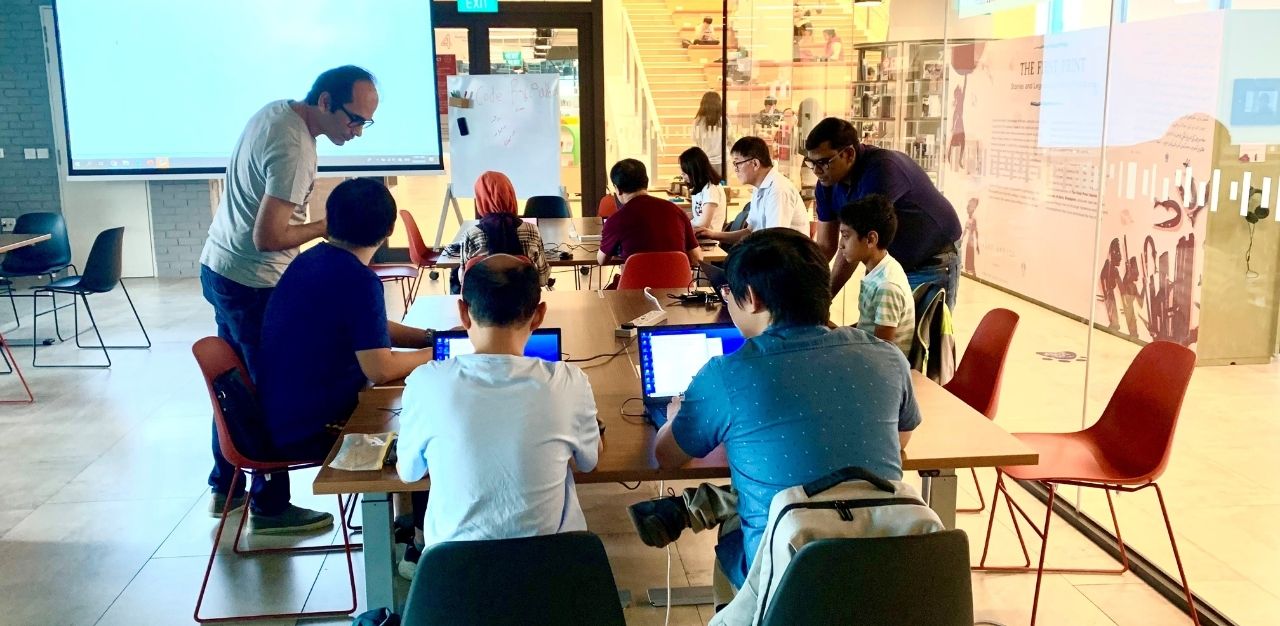
While digital sessions may involve less commitment on the part of attendees, he has observed that participants tend to be more enthusiastic. A 90-minute session can sometimes extend beyond its intended duration, he notes: “Because they are so engrossed, our classes go on for an hour extra, which is very motivating.”
Researcher, 31-year-old Ting Prekop is no stranger to the MakeIT programme. She used to visit the makerspace at Jurong Regional Library to attend 3D printing workshops. Having been exposed to similar makerspaces in London, she was pleased to discover the libraries’ makerspaces as an outlet for tinkering, when she moved to Singapore. Plus, it was accessible to the public, unlike many members-only makerspaces.
“It’s open to everybody and, really just for playing around rather than dedicated people who are renting spaces,” Ms Prekop says. “I thought it was amazing that it was free for everybody. In a library, the materials are supplied, and the people are friendly and helpful.”
Being a part of MakeIT’s Facebook group, she has tuned in to Facebook Live events, but prefers in-person sessions at the makerspaces, as she enjoys interacting with other participants, as well as the pace of physical workshops.
Meeting the needs of the public
NLB has also rolled out programmes to fit the needs of specific audiences, such as young children and teenagers.
One such initiative is The Little Book Box, a book delivery subscription service that provides subscribers with a monthly selection of English children’s books for a fee of S$32.10 (US$23.85). This was introduced in October, last year.
“Every month you get eight books delivered and we have two age bands: four to six, seven to nine. The books were curated by our librarians,” Ms Lau explains, adding that the subscription reached its maximum capacity of 1,200 subscribers, for each of the three cycles it has run thus far.
In-person storytelling sessions for children have also been converted to Storytime with our Librarians videos. These are made available on NLB’s Facebook page and the discoveReads portal, which provides resources for children and teenagers.
To produce these videos, librarians had to pick up skills like filming and video editing within a short span of time, with new recordings being released on a weekly basis.
“Our staff really rose to the challenge… They [had] to do the recording, scripting, acting, editing,” Ms Lau shares.
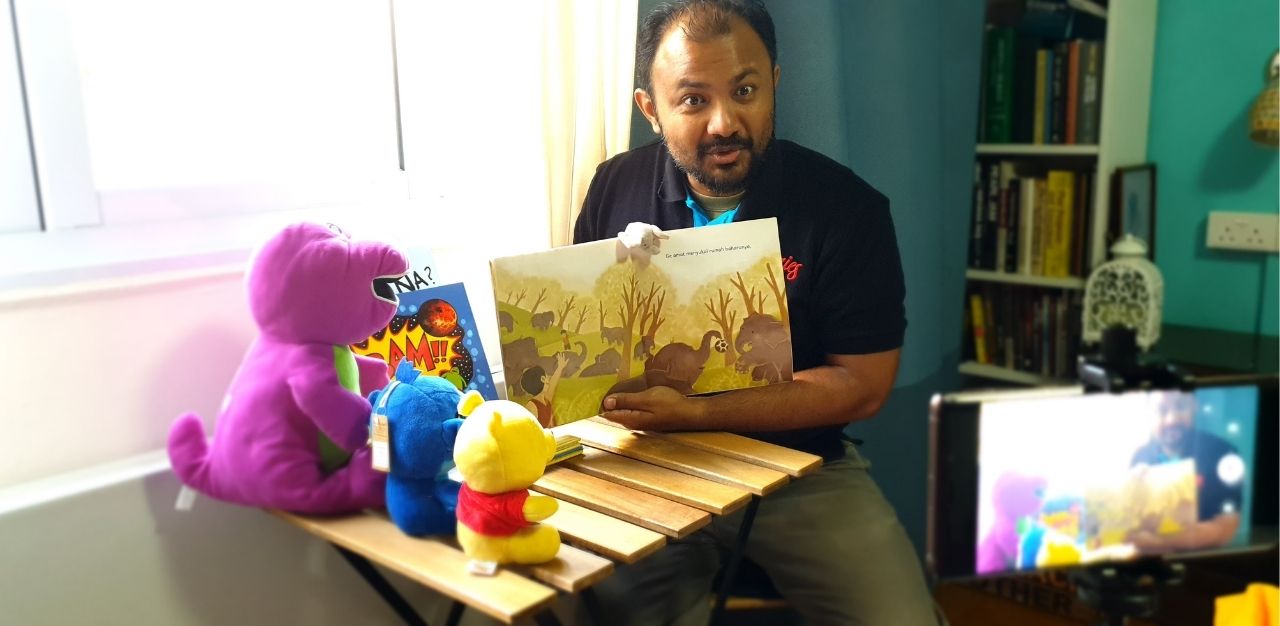
A host of programmes for teenagers have also been implemented, including entertainment options, such as online bullet journaling workshops, escape rooms, and talks on environmental sustainability. Another event that NLB came up with was the Study With Me online sessions, where participants gather virtually to study with their peers.
Maintaining a connection with seniors
Engaging seniors and equipping them with digital skills is another of NLB’s goals.
Ms Lau says that initiatives, like the SG Digital Office facilities, have been set up in 25 libraries islandwide, with dedicated ambassadors available to help seniors with their technology-related enquiries. Since its launch, the programme has reached out to over 27,000 seniors.
“The more common [enquiries received] relate to things that will support daily life during Covid,” she says. “How do they connect with a loved one over Zoom, FaceTime, how to perform some of their daily activities like e-banking, even learning how to use the TraceTogether [mobile] app.”
Supporting senior-centric interest groups are also a priority, for the purpose of encouraging engagement and interaction. Take the Tampines Ukelele Jammers.
Co-founded by volunteer Shamimah Mujtaba in 2018, it is an interest group for those aged 50 and above that aims to bring seniors together through a shared passion for the ukelele. Ms Shamimah says that the group meets twice a month, and has been conducting sessions online since May 2020, due to the pandemic. To facilitate rehearsals, lyrics and chords are shared on-screen during digital sessions.
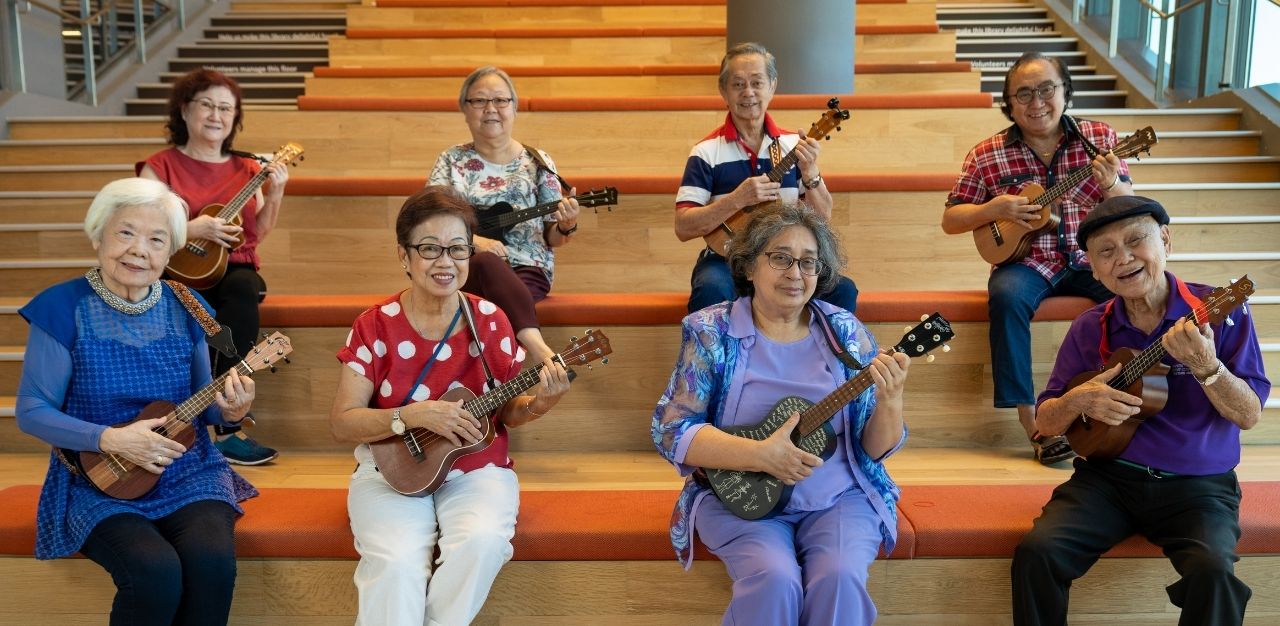
In the process of adapting to rehearsals online, she noticed a fall in the number of members attending sessions. At its peak, the group had as many as 80 members turning up for in-person rehearsals, which dropped to 50 attendees for digital sessions. But bringing rehearsals online has attracted new members. Ms Shamimah estimates that 20 to 25 per cent of current attendees joined the group after digital sessions were introduced.
While she enjoys the versatility of hosting rehearsals online, which has allowed them to continue, she still prefers in-person jamming sessions.
“You have more of an interaction before and after [the session]. Whereas a Zoom meeting tends to be very structured in the sense that you start, end, and that’s it,” she explains.
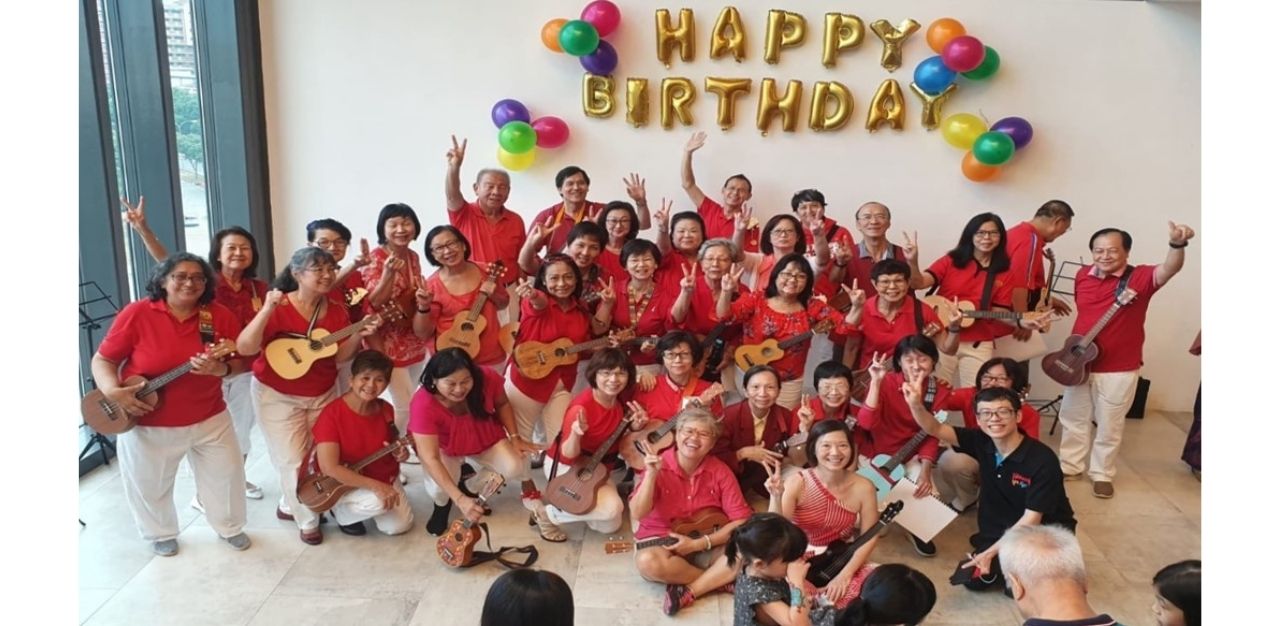
Still, she looks forward to attending jamming rehearsals in person, as the group’s last physical session was held in February last year.
“What we [would] like is for the library to help us get back to physical sessions, but we recognise the problems and the constraints,” she notes, and says that the group is considering adopting a hybrid model of in-person and digital sessions.
Ultimately, Ms Lau believes that the pandemic has compelled NLB to ramp up its efforts to digitise existing programmes, and to come up with new innovative ones that suit digital platforms.
“What Covid has done is that it has accelerated our [digitisation]. To some extent, we [didn’t] have a choice, especially when we [had] to close the library for three months,” she says, adding that it has motivated NLB to refresh the selection of programmes it has to offer. She emphasises the need to evaluate the impact of these initiatives and prioritise existing resources.
It is also important to consider how these activities support NLB’s mission to nurture a spirit of learning, she says: “What is important is [to] always think about [the] library as a place to support learning… [To] look at learning not just as [an] individual transaction, [and] really connect all of these learning opportunities.”
Join the conversations on TheHomeGround Asia’s Facebook and Instagram, and get the latest updates via Telegram.












